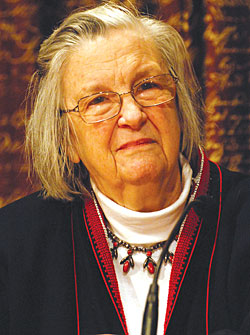 |
Elinor Ostrom is an American political scientist who received the Nobel Prize for Economic Sciences last year, for her work on the successful indigenous practices of Nepal. She is visiting the capital this week.
Since 2002, when the tenure of elected local governments across Nepal ended, issues of local governance, good governance, resources and structure have been absent from political vision. Village-level indigenous practices of cooperation and collaboration that are rooted in history have also been gradually eroded. The issue of native practices, which form a part of the Nepali identity, have not received attention since Nepal witnessed massive political transformation in 2005-2006. Instead, the centre's policies were imposed even at local level to strengthen vested political interests. In the transition to a federal republic, issues of local level governance have barely featured in political and constitutional debates. The entire state is centralised. It seems as if local governance modules and community initiatives have failed.
But if it were so, Professor Elinor Ostrom would not have found Nepal to be one of the exemplars of successful community and local governance. Having chosen Nepal as her area of research, she was awarded the Nobel Prize in economics in 2009. This did not just bring Ostrom into the limelight but also gave a new dimension to the Nepali identity that was sketched out by Tony Hagen in the 1950s � of successful indigenous cooperative practices.
A professor at Indiana University in Bloomington, United States, Ostrom visited several villages during her research to identify community forests and irrigation systems, as well as other community development ventures that mobilised local resources. Ostrom's argument that people and community-based organisations are more committed to the rules crafted by themselves than to decrees imposed by the state or to solutions provided by donor agencies has been bolstered by successful examples in Nepal. Her argument that local residents and community are best equipped to manage local natural resources was based on successful paradigms in countries like Nepal, Kenya, and Nigeria. In her last visit to Nepal in 2002, Ostrom visited Chitwan, Sindhupalchowk, and Dang to study good governance exercises surrounding groundwater irrigation.
It is no coincidence that she is visiting Nepal at a time when the country stands at the crossroads of constitution writing and state restructuring. It must have been her special attachment to Nepal that compelled her to accept the official invitation from the Government of Nepal, enabled by The Asia Foundation. Over three days, she will meet President Ram Baran Yadav and interact with senior officials of the Nepal Government on the theme of local good governance and resource utilisation. Ostrom is also the keynote speaker for the Annual Mahesh Chandra Regmi Lecture organised by Social Science Baha on 7 December.
READ ALSO:
False consensus
Maoist resolution
Minister gets home
Disgraceful game


